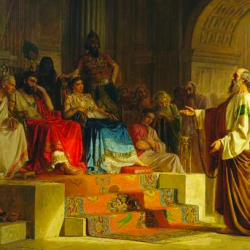Editor's Note: Below is a "Monday Sermon," from our series of sermons at the Patheos Preachers Portal that pastors can enjoy and learn from. It is our hope that this particular series from Daniel Harrell, which preaches through the Church Fathers, will encourage pastors, show them a way of approaching theological education from the pulpit, and refresh their theological memories. See Reverend Harrell's columnist page for more information.
One of the things that's interesting about Park Street Church is our sign out front. Of all the adjectives we could have placed on it, we chose to place the descriptor "Trinitarian." While "Trinitarian" smacks of polytheism to Jews and Muslims, and of celestial mathematical nonsense to others, being Christian generally equates with being Trinitarian—so much so that putting "Trinitarian" on your church sign seems redundant.
However it wasn't always this way. Long before Unitarians took over many New England Congregational churches and before Jehovah's Witnesses knocked on doors disputing the divinity of Jesus, well-meaning and faithful Christians fought over how it possibly could be that the God who is One is at the same time Three.
The Trinity-affirming Apostles' and Nicene Creeds did not emerge from casual theological chats over coffee and doughnuts. Some centuries later, squabbling over the Trinity persisted, leading to the first major church split between the Roman Catholicism and Eastern Orthodoxy in 1054. Controversies concerning the Trinity also fractured Protestantism following the Reformation.
"Trinitarian" on Park Street's sign points to our own determination to distinguish ourselves from 19th-century Unitarian encroachment. Back in the 17th and 18th centuries, amidst a theological restiveness sparked by the Reformation and stoked by the Enlightenment, the Trinity came under particularly fierce attack. Into this fray emerged Jonathan Edwards with his combination of extraordinary intellect, biblical fidelity, and openness to new insights in light of personal experience. His recent biographer George Marsden declares him ". . . the most acute early American philosopher and the most brilliant of all American theologians."
About seven years ago I embarked on an occasional sermons series regarding the Church Fathers, those personalities who over the early centuries of church history fashioned our faith and codified that which we have come to embrace as orthodox Christianity. As there have been numerous noteworthy Church Fathers (and Mothers), it seemed sensible to tackle them a letter at a time. However, since many of the patristic heroes cluster around the letter A—Ambrose, Athanasius, Augustine, Anselm, and Aquinas for instance—it took me three years to advance to the letter B. Once there I covered the Venerable Bede, St. Benedict, and Bernard of Clairvaux (omitting to my great chagrin, Basil the Great). Letter C included John Chrysostom, Catherine of Siena, John Calvin, and the baroque painter Carravagio. Last year, a paucity of D-fathers left us looking at Dionysius the Areopagite, Dominic, and Dante.
Now you Patristic scholars out there readily note how I have exceedingly stretched the notion of "church father." Technically, to be a Church Father, you had to live in the first five centuries of Christianity. But seeing as we're mostly evangelical Protestants here (which means that our grasp of church history generally stretches back only as far as C.S. Lewis), I've dispensed with such technicalities. Therefore, as I reached Letter E, I offered the late 13th-century German mystic Meister Eckhart and will soon turn our attention to the 20th-century poet T.S. Eliot (who actually spoke at Park Street once). For now, we plumb the thoughts and life of Jonathan Edwards, whose life just preceded the American Revolution and served to shape the theological tradition in which our own church is steeped.





